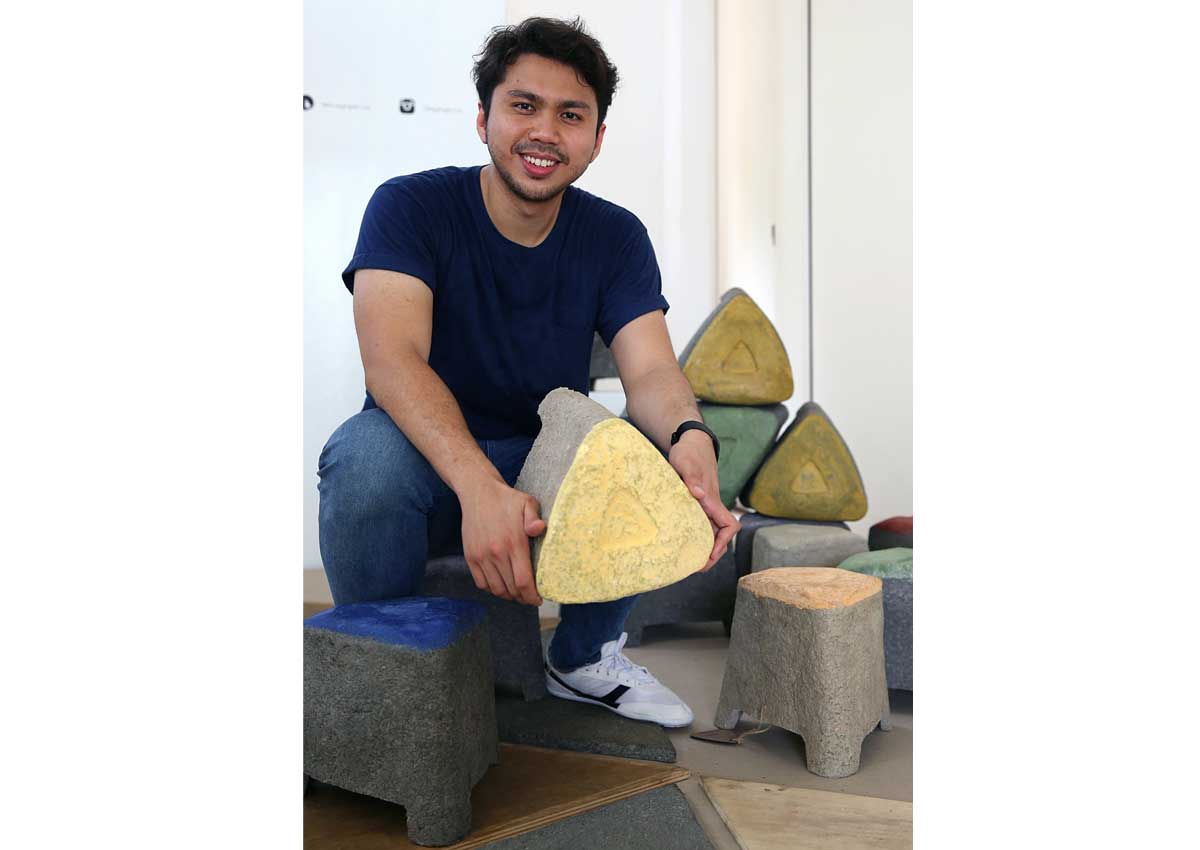When he told locals in Sumatra that he wanted to make stools out of old newspapers, they laughed at him.
But they agreed to help him because the income would put more food on the table for their family.
After his final-year project on stool design in university, Mr Mohamed Hafeez Mohamed Shah, 26, had an idea to produce a solid material from old newspapers and biodegradeable plastic. The new material, called Nupaper, was inspired by papier-mache and has since been used to produce stools for children.
“I wanted to create products that are safe and eco-friendly, so I started out by making stool after stool out of recyclable items before I finally created the formula to make it light but strong,” he said.
It takes about 700g of newspaper to make one stool, which takes about 20 minutes to complete.
Mr Mohamed Hafeez says his creations have held up under as much as 120kg.
After his graduation from Nanyang Technological University’s School of Art, Design and Media in June last year with a degree in product design, Mr Mohamed Hafeez joined One Stop Interiors as a design project coordinator.
And he was lucky enough to interest his boss in his idea.
“When they told me to pursue this idea of making stools with Nupaper, I immediately started planning ways to mass-produce the stool,” said Mr Mohamed Hafeez. “I wasn’t going to let the opportunity slip out of my hands.”
In January, he went to Central Java in the outskirts of Sumatra, where his company has a factory, to plan out the production process. He also recruited locals there to work on the project.
“I had a local contact who helped me to recruit some trishaw peddlers and housewives. I wanted to start with the people I see on the streets first,” said Mr Mohamed Hafeez.
LAUGHED AT
“When I first told them about my project, they laughed at me.
“So to further entice them to work on my project with me, I printed polo shirts with the Nupaper logo on it and distributed it to them. “They were so excited at the sight of the shirts.”
The trishaw peddlers gather old newspapers for the housewives to process and mould into stools.
The raw materials are dried under the sun and mixed in a wok over heat.
“It was like ‘masak-masak’ (cooking in Malay) for the housewives. They also enjoy it because they get to work with their friends,” said Mr Mohamed Hafeez.
Sales and marketing director of One Stop Interiors, Mr Shaffiq Olia, 37, said Mr Mohamed Hafeez’s passion in what he does is rare in a person his age.
“The company funds the project, but it was Hafeez’s drive to create an industry where old newspapers can be converted to materials that got it where it is now,” he said.
“We also loved the idea of individual stools made by different hands.”
Mr Shaffiq hopes the project will create an awareness to the community about ways to recycle.
“This is not just some corporate social responsibility project. This is also the start of our collaboration with communities in Indonesia to create something unique,” he added.
The pair declined to disclose how much they have spent on the project, but said “it’s a little too much to quit now”.
In a video on the Nupaper website, Madam Parmi, 35, one of the housewives who took part in the manufacturing process of the stools, said: “Because of the increasing economic demands, I feel that we (housewives) should start working too.
“Now, after working with Nupaper, I’m able to contribute to my family’s income.”
Mr Mohamed Hafeez is also looking forward to producing a wider range of products in the future and recruiting more people to join his project.
“There are still many things I’m still figuring out and have to improve on before this product hits the market, but the most satisfying thing to me so far had been when I see the locals enjoy what they are doing,” he said.
“Since the stools we are producing right now are for children, I hope this will also seed the idea of recycling to the younger generations.”

This article was first published on March 14, 2016.
Get The New Paper for more stories.






